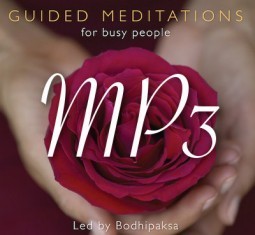Could meditating as a cure for insomnia backfire?
 When I find myself awake in the middle of the night, perhaps after a trip to the bathroom or a weird dream, I often practice some kind of meditation to quiet my over-active mind. I’ll usually pay attention to my breathing, or do a body scan, and most times this will help me calm down and nod off.
When I find myself awake in the middle of the night, perhaps after a trip to the bathroom or a weird dream, I often practice some kind of meditation to quiet my over-active mind. I’ll usually pay attention to my breathing, or do a body scan, and most times this will help me calm down and nod off.
But could meditating in the middle of the night create its own problems? Someone asked me whether this practice could either lead to us developing the habit of falling asleep during meditation, or keep us awake because mindfulness is so associated with alert attention that we can’t fall asleep.
I don’t think the first is much of a danger; we’re not likely to end up training ourselves to fall asleep in meditation. What happens when we can’t sleep is that intrusive mental activity inhibits the normal physiological mechanism that causes sleep. By being more mindful of the body, we let go of that mental activity, stop inhibiting sleep, and nod off. But in normal meditation (unless you’re already very tired) the physiological mechanism leading to sleep isn’t active, and so you’re not likely to drop off.
Not only can the second problem happen, but it’s something I’ve experienced many times. Meditation isn’t just about relaxation, but involves the arising of counter-balancing “active” qualities like curiosity, interest, and physical arousal. While calmness and relaxation are more likely to predominate when we meditate in order to get to sleep, sometimes alertness will prevail, so that we find ourselves in a “perked up” state that isn’t conducive to nodding off. But if that happens, I think it’s just a signal that we need to take another approach.
I find that visualizing soothing but boring imagery works rather well. For example I’ll imagine rain pattering on the leaves of a tree, on a particularly gray and dismal day. This counteracts the thought patterns and the emotional arousal that prevent sleep from happening, but it makes for a dull experience, and so I don’t get excited about it. I sometimes suspect that I fall asleep just so that I can dream about something more interesting!? This isn’t classic meditation, obviously, but it’s a good way of applying the principles of meditation in order to bring about a desired result — in this case a good night’s sleep.
 If you like our articles and want to support the work we do, please click here to check out our ebooks, guided meditation CDs, and MP3s.One way that middle-of-the-night meditation has backfired on me has been when I’ve woken from an anxious dream, and taken my attention to the feeling of anxiety. Normally what I’d do is to give the anxiety some compassionate attention, and to sooth myself by being aware of the breathing down in the belly. But recently I’ve found that if I try being mindful in the middle of the night, my experience of the body changes radically. The body’s solidity and sense of form dissolves away, and I’m left with an experience of a translucent cloud of sensations hovering in space. The first couple of times this happened there was a “What the heck?” reaction that led to me remaining awake, seemingly for hours, just observing this phenomenon. But now that I’m used to this happening, I quite quickly get back to sleep again. Perhaps a general lesson is that if using meditation to overcome insomnia doesn’t work at first, keep going. It may be something that you need to persist with.
If you like our articles and want to support the work we do, please click here to check out our ebooks, guided meditation CDs, and MP3s.One way that middle-of-the-night meditation has backfired on me has been when I’ve woken from an anxious dream, and taken my attention to the feeling of anxiety. Normally what I’d do is to give the anxiety some compassionate attention, and to sooth myself by being aware of the breathing down in the belly. But recently I’ve found that if I try being mindful in the middle of the night, my experience of the body changes radically. The body’s solidity and sense of form dissolves away, and I’m left with an experience of a translucent cloud of sensations hovering in space. The first couple of times this happened there was a “What the heck?” reaction that led to me remaining awake, seemingly for hours, just observing this phenomenon. But now that I’m used to this happening, I quite quickly get back to sleep again. Perhaps a general lesson is that if using meditation to overcome insomnia doesn’t work at first, keep going. It may be something that you need to persist with.
Related posts:
Keeping a level head while meditating
Meditating with IBS (Irritable Bowel Syndrome)
When you’re afraid of meditating
Related posts brought to you by Yet Another Related Posts Plugin.



